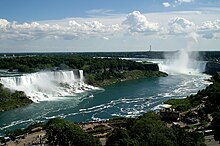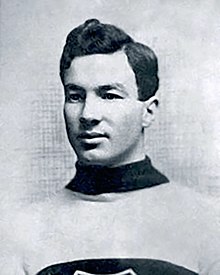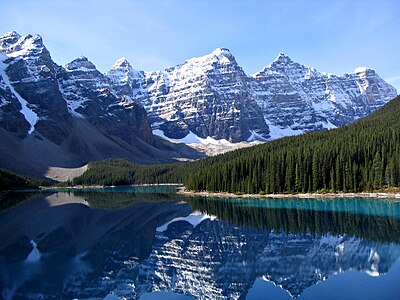Portal:Canada
| Showcase | Content | Contributing |
Introduction
Canada is a country in North America. Its ten provinces and three territories extend from the Atlantic Ocean to the Pacific Ocean and northward into the Arctic Ocean, making it the world's second-largest country by total area, with the world's longest coastline. Its border with the United States is the world's longest international land border. The country is characterized by a wide range of both meteorologic and geological regions. It is a sparsely inhabited country of 40 million people, the vast majority residing south of the 55th parallel in urban areas. Canada's capital is Ottawa and its three largest metropolitan areas are Toronto, Montreal, and Vancouver.
Canada is a parliamentary democracy and a constitutional monarchy in the Westminster tradition. The country's head of government is the prime minister, who holds office by virtue of their ability to command the confidence of the elected House of Commons and is "called upon" by the governor general, representing the monarch of Canada, the ceremonial head of state. The country is a Commonwealth realm and is officially bilingual (English and French) in the federal jurisdiction. It is very highly ranked in international measurements of government transparency, quality of life, economic competitiveness, innovation, education and gender equality. It is one of the world's most ethnically diverse and multicultural nations, the product of large-scale immigration. Canada's long and complex relationship with the United States has had a significant impact on its history, economy, and culture.
A developed country, Canada has a high nominal per capita income globally and its advanced economy ranks among the largest in the world, relying chiefly upon its abundant natural resources and well-developed international trade networks. Recognized as a middle power, Canada's strong support for multilateralism and internationalism has been closely related to its foreign relations policies of peacekeeping and aid for developing countries. Canada is part of multiple international organizations and forums. (Full article...)
Featured article -
Niagara Falls (/naɪˈæɡərə/) is a group of three waterfalls at the southern end of Niagara Gorge, spanning the border between the province of Ontario in Canada and the state of New York in the United States. The largest of the three is Horseshoe Falls, which straddles the international border of the two countries. It is also known as the Canadian Falls. The smaller American Falls and Bridal Veil Falls lie within the United States. Bridal Veil Falls is separated from Horseshoe Falls by Goat Island and from American Falls by Luna Island, with both islands situated in New York. (Full article...)
Featured biography -
Arthur Howey Ross (January 13, 1885 – August 5, 1964) was a Canadian professional ice hockey player and executive from 1905 until 1954. Regarded as one of the best defenders of his era by his peers, he was one of the first to skate with the puck up the ice rather than pass it to a forward. He was on Stanley Cup championship teams twice in a playing career that lasted thirteen seasons; in January 1907 with the Kenora Thistles and 1908 with the Montreal Wanderers. Like other players of the time, Ross played for several different teams and leagues, and is noted for his time with the Wanderers while they were members of the National Hockey Association (NHA) and its successor, the National Hockey League (NHL). In 1911, he led one of the first organized player strikes over increased pay. When the Wanderers' home arena burned down in January 1918, the team ceased operations and Ross retired as a player. (Full article...)
Selected panorama -
Panoramic view of Mont-Tremblant, Quebec
Credit: Acarpentier (Alain Carpentier)
National symbol -
"O Canada" (French: Ô Canada) is the national anthem of Canada. The song was originally commissioned by Lieutenant Governor of Quebec Théodore Robitaille for the 1880 Saint-Jean-Baptiste Day ceremony; Calixa Lavallée composed the music, after which French-language words were written by the poet and judge Sir Adolphe-Basile Routhier. (Full article...)
Selected vital article -
Canadian cuisine consists of the cooking traditions and practices of Canada, with regional variances around the country. First Nations and Inuit have practiced their culinary traditions in what is now Canada for at least 15,000 years. The advent of European explorers and settlers, first on the east coast and then throughout the wider territories of New France, British North America and Canada, saw the melding of foreign recipes, cooking techniques, and ingredients with indigenous flora and fauna. Modern Canadian cuisine has maintained this dedication to local ingredients and terroir, as exemplified in the naming of specific ingredients based on their locale, such as Malpeque oysters or Alberta beef. Accordingly, Canadian cuisine privileges the quality of ingredients and regionality, and may be broadly defined as a national tradition of "creole" culinary practices, based on the complex multicultural and geographically diverse nature of both historical and contemporary Canadian society. (Full article...)
Selected picture -
Current events
- May 31, 2024 –
- Canadian serial killer Robert Pickton dies in prison after being attacked by another inmate earlier this month. (AP)
- May 21, 2024 –
- Canadian serial killer Robert Pickton is reported to be on life support after being physically attacked in a prison in Port-Cartier, Quebec. (Vancouver Sun)
- May 18, 2024 –
- Three people are killed and five others are injured in a boat collision on Bobs Lake in Ontario, Canada. (CBC News)
- May 17, 2024 –
- A child in Hamilton, Ontario, Canada, dies of measles, the province's first such death since 1989. (CBC News)
- The RCMP identifies the killer of four people in Calgary, Alberta, Canada, in 1976 and 1977 as American serial rapist Gary Allen Srery, who died in prison in 2011. (CFCN-TV)
- May 16, 2024 – Israel–Hamas war
- Global Affairs Canada announces sanctions on four "extremist" Israeli settlers in the West Bank for engaging in violence against Palestinian civilians and their property. (CBC News)
Did you know -

- ... that Canadian brothers Graeme and Jacob Saunders learned to sail at the Chester Yacht Club, and campaigned a two-person dinghy in the 2016 Summer Olympics?
- ... that because of the increasing prevalence of sesame allergy, the U.S. will join the EU and Canada in 2023 in instituting mandatory food labeling?
- ... that the roadless Solace Provincial Park in the Temagami area of Ontario, Canada, is considered as one of the most isolated, wild places in the province?
- ... that Siphesihle November was brought to Canada from South Africa for ballet training at age 11, and became a principal dancer with the National Ballet of Canada at 22?
- ... that Canadian photographer and architectural activist Brian Merrett's works prompted the preservation of Montreal's Shaughnessy House, now the Canadian Centre for Architecture?
- ... that Canadian politician Above Znoneofthe chose his name so as to be placed last on alphabetical ballots?
- ... that Oakwood Cemetery contains the graves of Confederate soldiers and officers, English, Canadian, and French World War II pilots, and Hank Williams?
Featured list -
Canada is a federation that comprises ten provinces and three territories. Its government is structured as a constitutional monarchy and a parliamentary democracy, with a monarch as its sovereign and a Prime Minister as its head of government. Each of the country's provinces and territories also has a head of government, called premier in English. Collectively, the federal Prime Minister and provincial and territorial premiers are referred to as first ministers. In French, the term premier ministre is used in both the federal and provincial/territorial contexts. (Full article...)
Main articles
Associated Wikimedia
The following Wikimedia Foundation sister projects provide more on this subject:
-
Commons
Free media repository -
Wikibooks
Free textbooks and manuals -
Wikidata
Free knowledge base -
Wikinews
Free-content news -
Wikiquote
Collection of quotations -
Wikisource
Free-content library -
Wikiversity
Free learning tools -
Wikivoyage
Free travel guide -
Wiktionary
Dictionary and thesaurus































